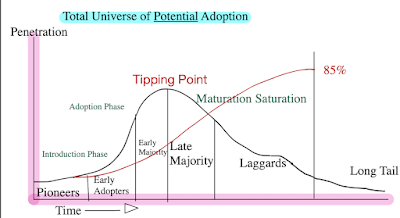Rogers' Diffusion for Innovations theory is a great lens to examine Facebook as it goes through a time of change.
Facebook's original idea was sparked from a site called FaceMash when Mark Zuckerberg wanted a way for the college students to meet with one another online. So, when Zuckerberg launched his site, the first 1,200 people that signed up in 24 became a part of the pioneer group. This was the group that was excited and saw the potential for the platform.
Soon Facebook expanded to Yale, Columbia, and Stanford. This marks the beginning of the adoption phase. These Facebook users on other college campuses were the early adopters that paved the way for everyone and their grandma to make a profile on the platform. However, that does not happen until much later.
 |
| Rogers' Diffusion of Innovations Theory |
Facebook then moved from its original collegiate-based platform to a platform of international recognition. By September of 2006, anyone who wanted to join could now sign up for the platform.
For Facebook, I would place the laggards in two categories: the older generation that is hesitant about social media and/or technology, and the younger generation that is hesitant to get on a platform filled with parents and grandparents. Depending on which time period you view as the tipping point for the platform determines who the laggards are.
The late majority of Facebook and its tipping point was in progress for a significant amount of years. It took data breaches and an aging group of Facebook users to signal this switch. Personally, I was reluctant to join Facebook, because I felt it was really just the domain of my parents. I made an account to join groups when I was applying to college but I do not currently use the platform, though my account is still active.
I think we are firmly in the long tail period of Facebook. Anyone who is now old enough to join the platform will be interested. Additionally, with Facebook's rebrand to Meta, the company may be attempting to start their potential of adoption once again.
However, with the frequent data breaches and scandals, is it worth it for Faceboook, or rather Meta, to have all this information? I think as Meta rebrands, their new name is not going to change their checkered past and potentially checkered future. The need for a rebrand in general reveals that there is an inherent flaw to the technology. The serious threat to our privacy will keep any laggereds away from the company. Though, I seriously doubt Meta will have trouble becoming popular.
As for me, I will have to do some serious contemplation before I dive head first into the Metaverse.




No comments:
Post a Comment